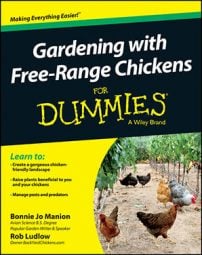Chickens in natural conditions forage for tender young succulent plant growth. Along the way they delight in finding bugs, insects, worms, and larvae. Chickens eat a wide range of foods such as plants, edibles, weeds, grass, berries, seeds, and more. Chickens can be a natural cog in the ecosystem wheel of your garden and landscape setting.
As an owner of your flock, it’s up to you to be proactive in keeping your chickens safe from anything that could be harmful to them in your garden setting. A short list is hazardous materials, predators, pesticides, and known deadly poisonous plants.
Chickens need a habitat that is heavily layered with plants, that provide food, shelter, and protection, which essentially simulates their original jungle-like environment. With dense plantings and many layers in a garden, chickens will be occupied, happy, fed, and will be less likely to destroy your garden. They will also be sheltered and protected by plant density, and the many layers of a garden.
Chickens, no matter how endearing and fun they are to have in your garden, are essentially small livestock, and must be effectively managed like any other type of livestock if you intend to free-range them.
This book is based on providing information for free-ranging your chickens effectively. Chickens do very well, however, in a confinement setting, such as a well set-up chicken coop, and adjoining secure outside pen, giving them ample space and square footage per bird.
Do not confine chickens in cages, otherwise you are raising chickens the same way they are raised in commercial poultry operations. Chickens are active, curious creatures. They prefer to have freedom of movement in seeking their natural diet, and their eggs will be tastier and healthier for you.
If you open your lush, beautiful gardens every year to be on a garden tour, you may not want to give your chickens free rein of the garden. If your property butts up next to a wilderness area, perhaps the predator risk is too high, and you’ll want to have your chickens restricted to their coop and a totally enclosed secure outside pen.
Maybe you have a homestead farm, and you plan on rotating your chicken flock in multiple pastures. No matter what your setting or situation is raising chickens, you have a variety of methods to choose from.
There are many variables to consider in laying out your land for some form of free-ranging chickens:
The size and design of your property and garden.
The type of plants and landscape growing in it.
How your property is maintained and managed.
Balancing your flock size with your allotted space. Always check your city/county zoning for flock size stipulations.
How you manage your chicken flock with your lifestyle.
How much dedicated time will your chickens be allowed to forage for themselves.

